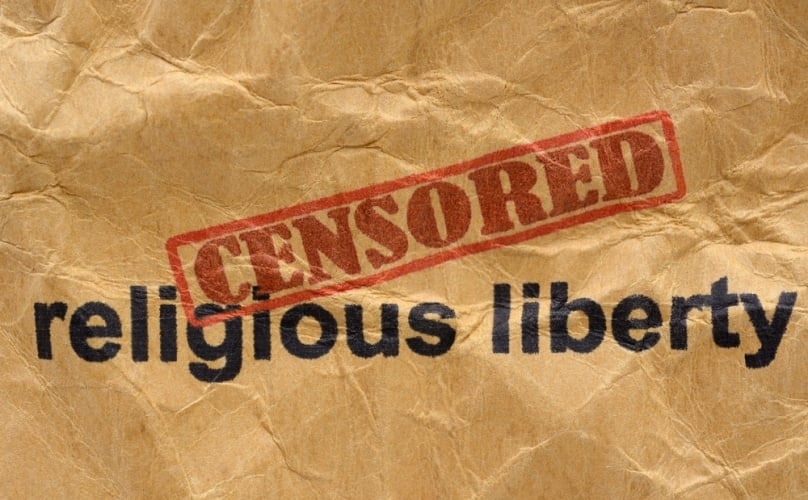
Imagine the following scenario: a same-sex couple says something like the following to their parish priest: “We identify as Catholic and we want to be part of the social justice group, to advertise an LGBT event in the church notices and to use the church meeting facilities. We want to hire church facilities for a same-sex wedding reception and LGBT functions.”
What will a priest do if he declines such requests and then faces an anti-discrimination charge?
What will parishioners do for their priest if he is prosecuted?
If this sounds like an exaggeration, the problem is that the law in Australia has become a moving feast as the radical sexual rights lobby continues to expand coverage for sexual orientation and gender identity in an ever-widening field of anti-discrimination laws, charters of human rights, IVF/surrogacy laws, adoption and fostering laws, relationships registers, the recognition of same-sex couples on birth certificates and legal right to change gender.
Currently, exemptions in state and federal laws provide religious bodies some protections. Generally, a religious agency cannot be required to act or practise in a way that violates the doctrines, tenets, beliefs, or religious susceptibilities of the adherents of that religion. Australia also has a strong implied right to freedom of speech that has been generally upheld by the High Court.
However, same-sex marriage will widen the reach of anti-discrimination laws to enable prosecution on grounds of sexual orientation and gender identity, greatly reducing the scope of people to speak and act in accordance with their beliefs and their conscience.
Example 1. Tasmania’s anti-discrimination law has already been used to attack the Church over its position on man+woman marriage, even when Australia has no same-sex marriage law.
For simply stating the Church’s position on marriage, Archbishop Porteous and the entire Catholic Bishops Conference faced prosecution under Tasmania’s anti-discrimination law by Greens candidate and transgender activist, Martine Delaney.
Tasmania’s Anti-Discrimination Act says that discrimination occurs when someone “engage(s) in any conduct which offends, humiliates, insults or ridicules another person” on the grounds of sexual orientation (heterosexual, homosexual and bisexual) or self-defined gender identity. The radical sexual rights lobby promotes over 50 sexual identities, which a person chooses according to how they feel. So in Tasmania, a person can claim any sexual identity and it’s automatically protected in law.
Sexual identity and the definition of discrimination are vague concepts in this law and are wide open to interpretation, with the capability to silence freedom of speech by prosecuting not only bishops, but priests and anyone not compliant with the law.
For the moment, Martine Delaney has withdrawn the case against Archbishop Porteous and the Bishops’ Conference. Perhaps it was a tactical decision as
Delaney has said, “…they need to know that I’m not backing down”.
Example 2: Before the 2013 ACT same-sex marriage law was overturned by the High Court, the ACT attorney general said that there would be no exemptions for businesses declining their services for a same-sex wedding and
reception. They would face prosecution.
Now Labor leader Bill Shorten has made clear that if he wins the election, there will be no exemptions for businesses that decline to provide their services for a same-sex wedding.
A federal same-sex marriage bill may exempt ministers of religion from performing same-sex marriages, but when a church hires out facilities, then the Church is acting as a business.
If Mr Shorten’s marriage proposal becomes law, will Churches be required to hire their facilities for a gay wedding, or for activist LGBT activities? Or will
exemptions in current anti-discrimination laws allow a minister of religion to say no without facing prosecution? That question may well have to be decided ultimately by the courts. Regardless of the outcome, the process is the punishment.
Further, if the Greens gain the balance of power, then the Federal exemptions for churches may be repealed altogether. In which case, even a minister of religion declining to publish a notice in the parish bulletin for an LGBT event may face prosecution.
In a 2012 dissenting report on same-sex marriage, seven Labor senators warned that exemptions for the churches are “hollow and tactical in nature rather than a matter of substance”.
Once, freedom of religion was a right. Now it is subject to problematic ‘exemptions.’
Example 3. A church’s right to refuse to hire its facilities to a group that acts contrary to the church’s moral teaching has already been tested in Victoria.
In 2014, the Victorian Supreme Court ruled that the Christian Brethren violated Victoria’s Equal Opportunity Act and Charter of Human Rights and Responsibilities Act in refusing to hire their facilities for a weekend LGBT youth camp.
A new authoritarian state?
Democracies are built on tolerance, a willingness to allow the existence of opinions or behaviours that one does not necessarily agree with.
However, the interaction of a same-sex marriage law with anti-discrimination and other laws will create a new “intolerance” that threatens freedom of speech, which is necessary for both freedom of religion and a true democracy.
If same-sex marriage is legalised, more bishops, priests and parishes can expect to be attacked under a new form of authoritarian state.
